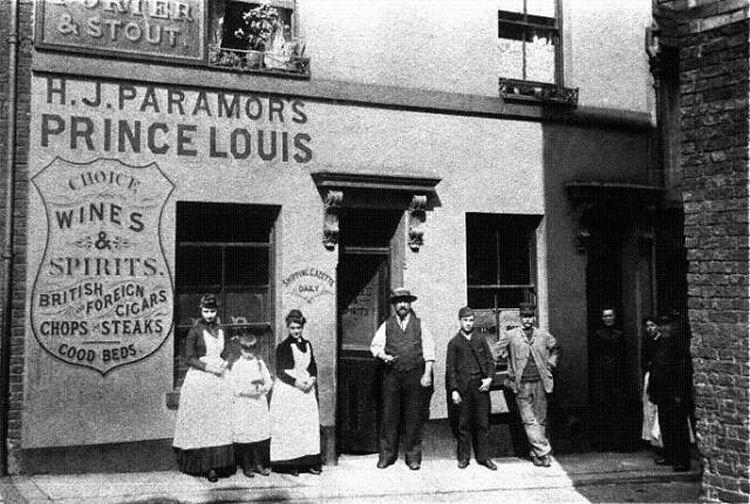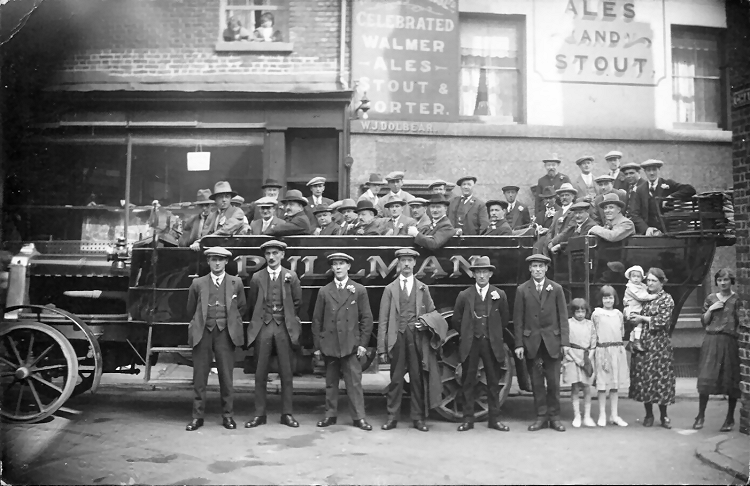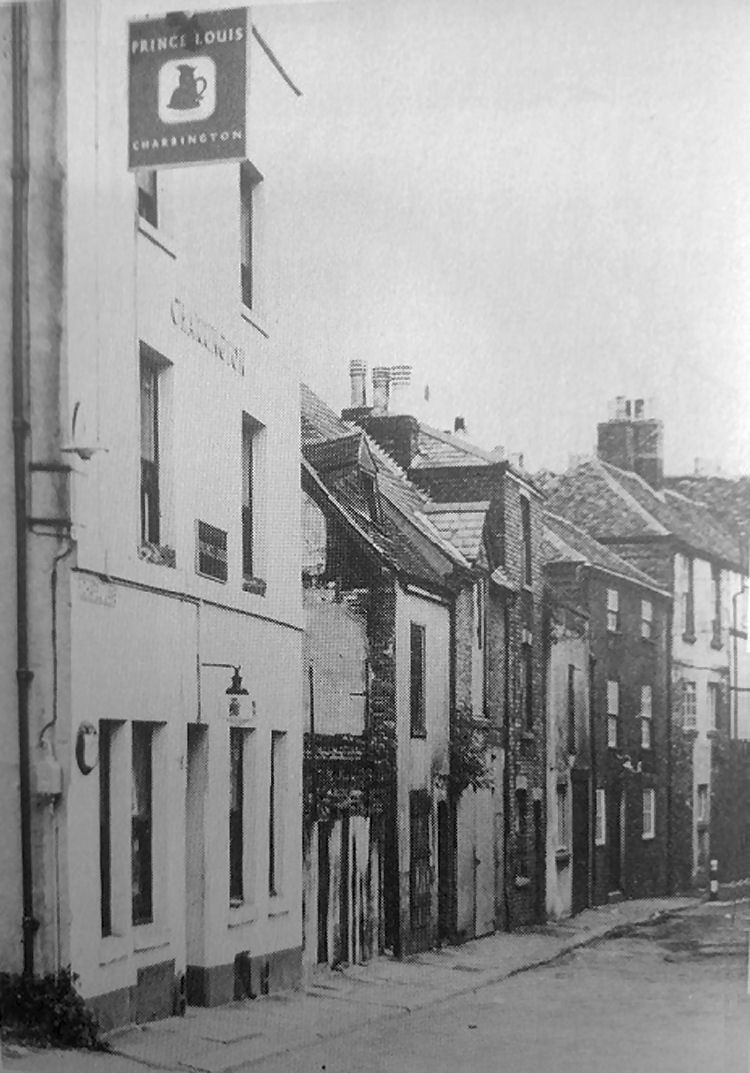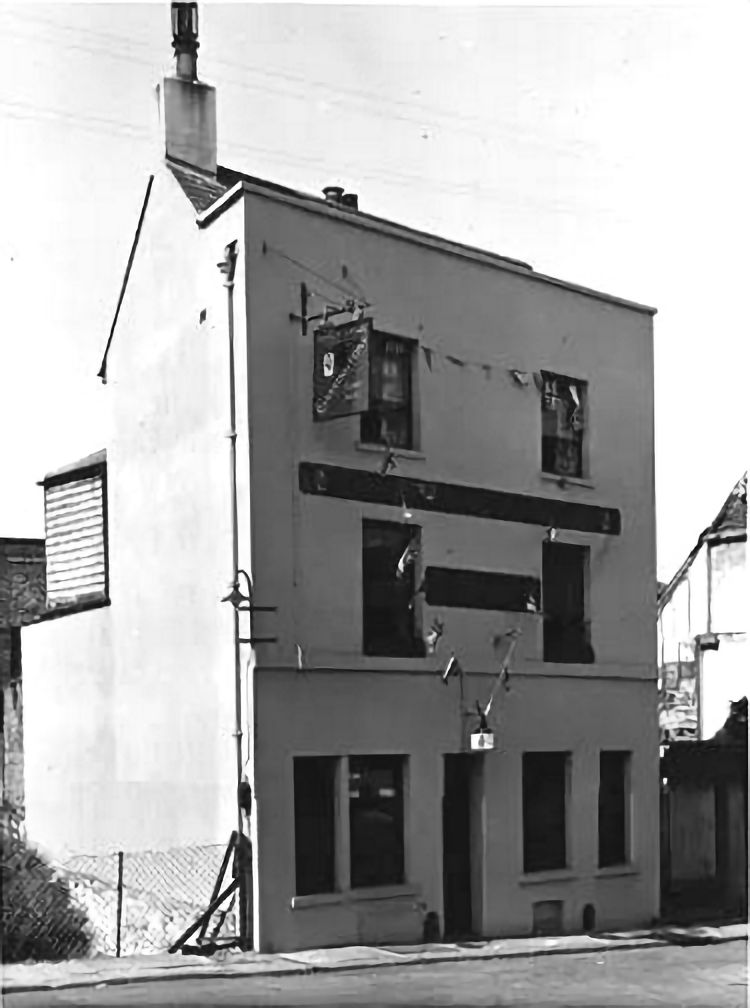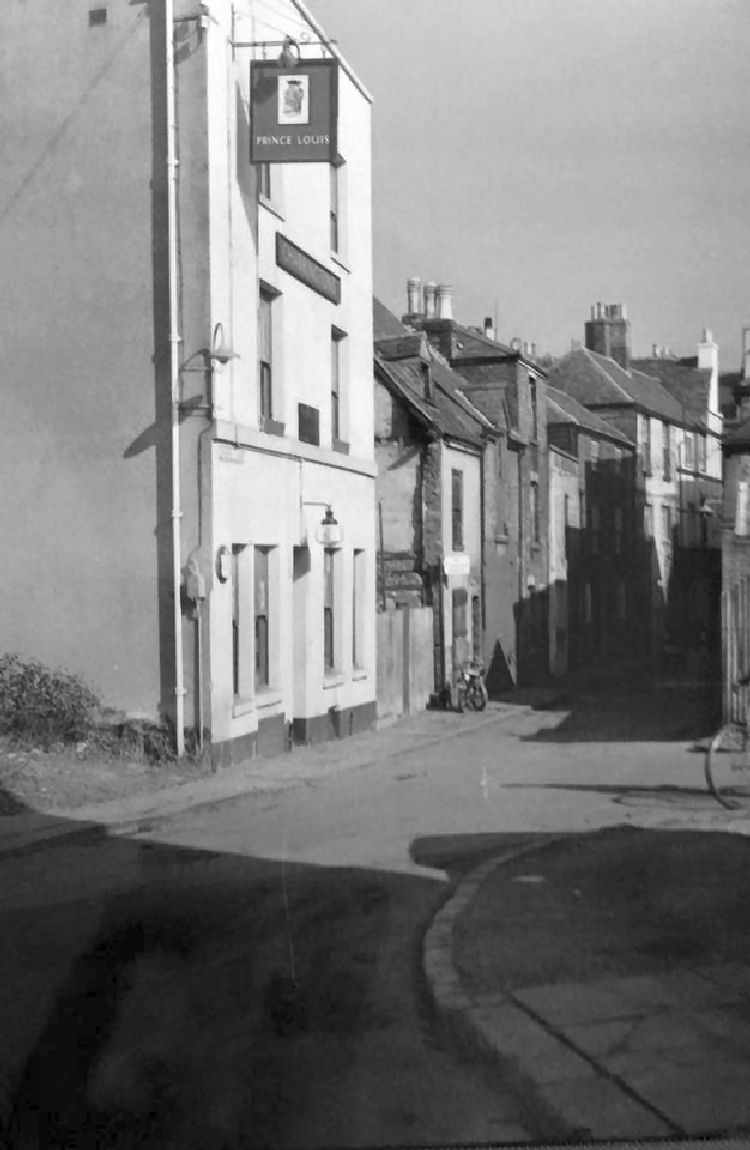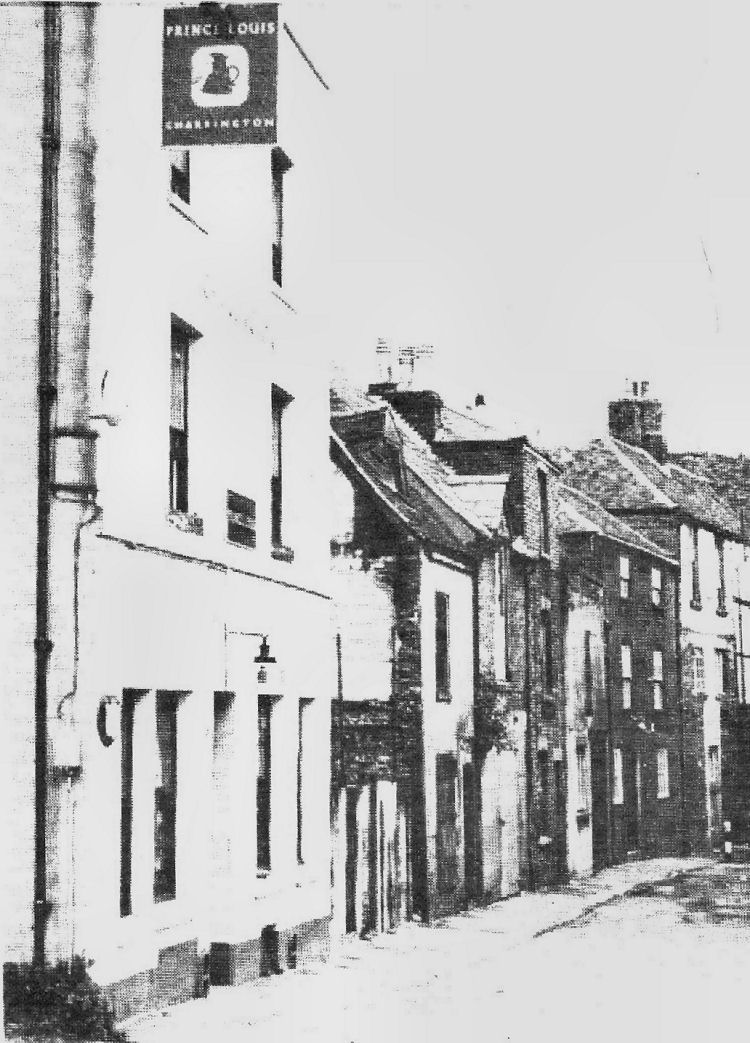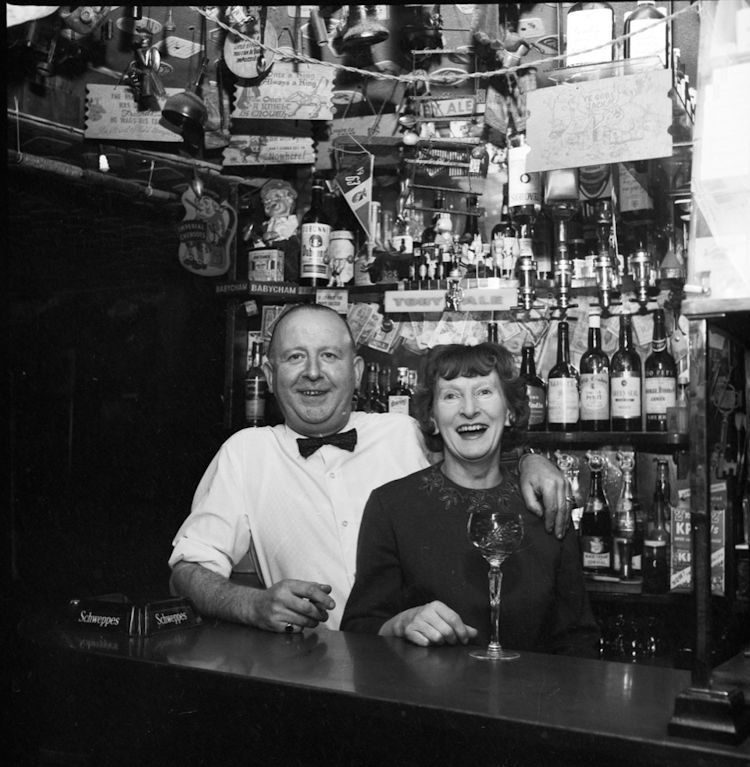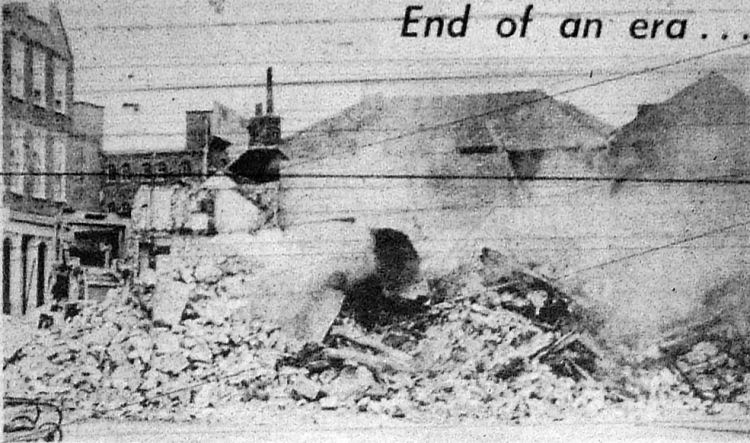|
From the Dover Express and East Kent News, Friday, 17 February, 1905. Price 1d.
PROSECUTION BY INLAND REVENUE
At the Police Court last Friaday, before Messrs. J. L. Bradley, F. W.
Prescott, and F. G. Wraight. Herbert George Pullen, landlord of the
“Prince Louis” public house, Chapel Lane, and A. Mangilli, restaurant
keeper, of 5, Bench Street, were charged on the information of James
Elgar, with selling on the 14th November, 1904, at 5, Bench Street,
spirits without having a license, whereby they forfeited a sum of £50.
They were further charged with selling on the 14th November, 1904, at 5,
Bench Street, beer, without having a license, whereby they forfeited a
sum of £20. They were further charged with selling a certain wine,
without a license, on the 14th November, 1904, whereby they forfeited a
sum of £20.
Mr. B. Hawkins, Solicitors' Office, Somerset House, appeared to
prosecute.
Mr. R. Mowll appeared for Mr. Pullen, and pleaded not guilty. Dr.
Hardman appeared for Mr. Mangilli, and pleaded not guilty.
Mr. Hawkins said this was a prosecution by the Commissioners of Inland
Revenue, which dealt with the question of the right of unlicensed
restaurant keepers to send out for intoxicating liquors to be consumed
by his customers. The customs was a very widespread one, and they were
not in this case seeking to say that the custom was necessarily illegal,
but in the case that he had put before them, under certain circumstances
the custom might be illegal. The informations were laid under the Excise
Acts. For spirits, section 26 6 Geo. IV. Chap. 81, the penalty for beer
under section 17 of the Act 4 and 5 Will IV. Chap. 85, and wine under
section 10 of the Act 23 and 24, Vic. Chap. 27. there were also two
other sections that he would ask their attention to. They were section
17 of 30 and 31 Vic. Chap. 19 – that section says that any person who
should receive profits from the sale of any article for which an Excise
License was required without obtaining such a license would incur the
penalty for the sale without a license. The other section, which related
to Mr. Mangilli, sectioned 26 of 6 Geo. IV. Chap. 81, provided that
where liquors were sold by an unlicensed person who was privy and
consented to the sale, he would be liable to the penalty, although not
actually the person selling. After detailing the evidence that he
subsequently called, he said that he did not think that there would be
any serious dispute as to the facts of the case, but would be rather on
the inference that the Magistrates would be asked to draw from these
facts, and on points of law. Referring to the widespread practice of any
unlicensed restaurant keeper sending out for intoxicating liquors to be
consumed by the customers at the restaurant, he referred to a case that
had been decided. Pasquire v. Neale. In that case the restaurant keeper
was charged with selling wine without a license. He was the proprietor
of a restaurant in Soho, and was a partner in a wine merchant's
business. An Inland Revenue officer went to the restaurant, and was
shown a wine list, and from this list a bottle of wine was selected. The
officer was asked for the money, and the waiter went to the licensed
premises of Mr. Pasquire, and purchased the bottle, for which he paid
apparently, but there was no evidence as to the price paid. The
Magistrates , Mr. Denman, thought there had been a sale of wine to the
officer at the unlicensed premises. The case was taken to the High
Court, but the High Court refused to reserve the decision. Of course
there was a certain amount of difference between that case and the
present one, but there was only one principle underlying all these
cases: The first question to be decided was where did the sale take
place – at the restaurant, or on the premises of the publican where the
wine was sent for? That question, he submitted, turned on the question
whether the restaurant keeper was the agent of the customer or of the
publican. If he were the agent of the publican, then the contract was
made between the customer and the publican's agent on unlicensed
premises. He submitted that Mr. Mangilli was the agent of Mr. Pullen.
There was an arrangement between the two not entered into at the request
of any particular customer, by which Mr. Pullen kept a stock of wines
for the sole purpose of being consumed by people going to the
restaurant, and for which Mr. Pullen charged a higher price then he
would to people going to his public house. In order to further the sale
of this wine, Mr. Mangilli had the wine list exposed in his restaurant
solely for the purpose of obtaining orders for these goods. He did not
expose other people's wine lists, and orders when received were at once
taken to Mr. Pullen's, and to no others, although on the way other
licensed premises were passed. He would submit that it was clear that
Mr. Mangilli and Mr. Pullen were carrying on jointly a business of
disposing at these unlicensed premises this stock of wine. That they
were jointly selling – Mr. Pullen as principle, if his statement were
true that he received the whole of the profits, and Mr. Mangilli as
agent.
James Blake Davies, in charge of the Preventative Department, said that
on the 14th of November he went to Mr. Mangilli's restaurant, 5, Bench
Street, Dover, with Mr. Cope, an officer of the Inland Revenue. He
arrived there at 7.05 p.m. and ordered dinner. Prior to entering he
posted two officers outside, Messrs. Hayward and Bate. On the table were
wine lists. The waiter serving handed him a wine list, and he ordered
Volney, price 2/6. and a 3d. Bass. The waiter asked for the money, and
he gave him half a sovereign. He gave the order at 7.17. At 7.23 the
waiter placed before him the bottle of Volney and the small Bass, and
the 7/3 change. At 7.33 he ordered two liquors of brandy and gave the
waiter a 1/-. The brandy was handed to him at 7.37 by the same waiter.
Mr. Cope drank the Bass, and witness drank a portion of the wine. Each
of them had a liqueur of brandy. When he left he was presented with the
bill (produced), which he paid.
The Magistrates Clerk: There is no reference to the drink?
Witness: No it is an ordinary bill.
On the 16th November he called upon Mr. Pullen, accompanied by Mr.
Brereton, Supervisor of the District. Witness saw Mr. Pullen there, and
he explained the object of his visit. He said, “I supply the price list
of wines,” and he handed me the one produced “to Mr. Mangilli.” It
contained the prices, the same as he sold them to Mr. Mangilli, who
received no discount, no commission, nor no return whatever. The price
list was his own making out. In the room where they were conversing he
saw a number of baskets of wine, which were numbered, the numbers
corresponding with the numbers on the list. He then said, “I should not
keep the stock of wine I do if not for Mr. Mangilli, as my trade is not
a wine trade. I had the wine lists printed and I supply these lists to
Mr. Mangilli.” Witness asked him to produce the book in which the
transactions with Mangilli and himself were recorded. He said he had no
book. Witness told him he knew there was a book. He then said,
“Mangilli's brings a book here when he makes purchases. Either I or my
wife make the entries in the book. In this book I enter the number or
the description of the wine, and the amount as shown in my price list.”
Witness asked him whether he took the trouble to keep a book like that
if all the money were paid in respect to each sale. He replied that the
book was kept so far that there should be no dispute as to what was
paid. Witness said, “Why does Mangilli keep the book?” He replied, “So
that there cannot be an overcharge.” He said that arrangement had
started last summer. Pullen said, “Mangilli used to go elsewhere, but I
did not think it fair to be made a convenience of on Sundays and Bank
Holidays when other spirit merchants were shut.” Mangilli said he could
not see why he should not. Witness put it that Mangilli's man passed
Lukey's. Pullen said “If he went to Lukey's he did not think he should
serve him or keep a stock of wine.” He said he had no call for wine as
very few of his customers ever asked for it. Witness then went to Mr.
Mangilli's at 5, Bench Street. He found Mr. Cope with Mr. Mangilli. Mr.
Cope handed him a book in which sales were recorded. This was the book
produced. The orders which witness gave were recorded in the book – the
Volney 2/6, brandy 1/-, and the small Bass. Witness asked My. Mangilli
when he made the arrangement with Pullen, and he said he could not
remember. Witness asked him if he gave the whole of his custom to Mr.
Pullen in consideration of Mr. Pullen serving him on Sundays and Bank
Holidays. He said, “I cannot remember.”
Dr. Hardman objected to the way the evidence was being taken. The
suggestions were all contained in the questions, and not in the answers.
The Magistrates Clerk said they would put it down as an answer to
further questions.
Dr. hardman: That is not the proper way; the evidence should be. “I
asked so and so, and he answered “So and so.” This is a three-hours'
cross-examination, or rather badgering.
The Witness: No, it was not; you were not there.
Witness asked him if he or his waiter kept a book. He said he did not
keep a book, nor did the waiter. He said the book (produced) was Mr.
Pullen's book. Witness asked who supplied the wine list, and he said Mr.
Pullen. Witness asked him who selected the wines, and he said Mr. Pullen
selected them, that being his business. He asked him who made the ticks
in the book, and he said he could not say. He said, “My people do not
touch the book.” Witness said he noticed a bottle of Johnny Walker
written there and Mangilli said that was for his own use. The waiter, in
going to Mr. Pullen's, would pass by Messrs. Lukey's wine merchants,
premises. Binfield's was close behind Pullen's premises. The
“Shakespeare” and the “Guildhall” were also close. Witness had read the
prices charged and the price list produced.
Mr. Mowll objected to witness being asked how these compared with
ordinary wine lists. Witness said he considered the bottle of Volney for
which he was charged 2/6 would have been dear at 1/-.
Cross-examined by Dr. Hardman. Witness produced his notes which he made
at Mr. Pullen's during his conversation with him. He went to Mr.
Pullen's at about 11, but the conversation with him and Mr. Mangilli did
not last till 2, as he had lunch at Mr. Mangilli's. The note was a
substantial record of what occurred.
Dr. Hardman: That is to say you took what you thought was in your
favour?
Witness: I took what he stated exactly.
Let us test it. You said that Mr. Mangilli said his book was at
Pullen's. I wonder whether you have got that? – You look and see.
I have and see you have not got that – I put several questions I did not
put down, and a portion of the conversation given today was given from
memory.
When you went in you said that you were handed a list. Do you suggest
that you did not call fro a wine list?
Yes. I saw a wine list on the table.
Did you not ask the waiter for a wine list?
Yes, to hand me the list on the table.
And you consider it a fair way of stating that the waiter handed you a
wine list when you asked the waiter for a wine list?
The wine list was a little out of my reach.
It does not matter whether it was or not, you asked them for the wine
list?
It saved me getting up and taking it.
Do you think it would be more accurate if you gave it as it took place?
I think my answer is quite consistent as recorded.
It is now; it is consistent with the truth?
And it was.
Dr. Hardman asked if the course pursued in getting the wine was not the
usual one?
Mr. Hawkins said the witness was not entitled to give his opinion.
Dr. Hardman: This gentleman is an expert.
Mr. Hawkins: Not on question of law, that is the whole point of the
case.
Witness in answer to further questions by Dr. Hardman said that he
repeatedly asked Pullen if he did not get some advantage from the sale
of wine at the restaurant, and he stated that the list contained the
price of wines as he sold then to Mangilli, and that Mangilli had no
discount.
Did it not occur to you that it was a reasonable thing in order to
secure the beer and spirit trade that Mr. Pullen might put himself to
some little inconvenience about he wines?
It struck me as unreasonable, and to be in accordance with other similar
cases that we have.
Dr. Hardman then proceeded to ask witness questions in reference to the
book, and the witness declared that Pullen told him that there was no
book.
Mr. Mowll pointed out that the answer in witness's own notes was that
Pullen said he had no book, which was a very different thing.
Witness continuing said that Mr. Pullen gave him a reason for keeping
the book, but he did not believe it.
Now with reference to what you call the arrangement. Mr. Pullen clearly
explained to you how that came about?
Yes.
He explained to you that Mr. Mangilli sent to different places, and that
he was anxious to secure the custom, and that the shops closed early on
Wednesdays and on Sundays?
Yes.
Do you know that Lukey's or Binfield's cannot sell 6d. of brandy or
liquors?
Yes, but he could get it from the “Shakespeare.”
And therefore Pullen was anxious that Mangilli should not make a
convenience of him on Sundays, but should give him the other trade.
He said that the arrangement was come to in consideration of his
supplying on Sundays and Bank Holidays, and that he was to get the whole
of his custom right through, as he put it.
Witness, in reply to further questions, said that he could not say that
the “Prince Louis” was the closest licensed house. He did not subject
Mr. Mangilli to a cross examination of more than half an hour. He began
to cross examine Mr. Mangilli about the arrangement after Mr. Cope
finished. Mr. Mangilli's Italian origin was no difficulty to him. He
understood English perfectly, and was well acquainted with the law. The
reply “I cannot remember” was what they usually got from the Italians.
Witness on being pressed, admitted that Mr. Mangilli answered a great
many questions other than by saying, “I do not remember.” He first said
when witness asked him whether he had any discount or commission “I
cannot remember,” but he said after, “None whatever.”
Dr. Hardman: This is the first time you have admitted this. Do you call
that a fair way of giving evidence?
Witness, in reply to further questions said that he did not tell
Mangilli that he was certain there was a secret arrangement as they were
not fools; he would not have used the latter expression, although he
might have said there was a secret arrangement. The conversation took
place upstairs. Mangilli did not tell him that he used to deal at the
“Shakespeare” but had ceased for certain reasons. Whilst they were
conversing with Mr. Mangilli Mr. Cope went to Mr. Pullen's, but he
certainly never authorised him to say, “Look here, if you give Mr.
Mangilli away we will not prosecute you,” and to tell Mr. Pullen what he
should say.
Cross-examined by Mr. Mowll: Witness said that he considered he
purchased the wine, etc., off Pullen according to the wine list.
Alfred William Cope, officer in the Inland Revenue Prevention Staff,
said that on the 14th November he accompanied Mr. Davies to Mangilli's
and corroborated his statement as to the meal. He was at Mangill's
premises on the 16th November. He corroborated Mr. Davies's statement as
to what took place between Mr. Davies and Mangilli. He went to Pullen's
from Mangilli's, and returned afterwards. He denied that he said to
Pullen that he would not be prosecuted if he gave Mangilli away. He
asked witness what he could do, and he advised him to see a solicitor.
Previously, on the 16th, he had a conversation with Mangilli, and told
him that he knew he had a book in which entries were made relating to
the supply of wines from the “Prince Louis.” Witness looked round and
saw the book (produced) on a shelf behind the bar. Mr. Mangilli at first
refused to get it but on witness stepping to get it, showed it to him.
He told Mangilli that Mr. Davies was at Pullen's. he said that he had a
wine license for his business at Deal. Witness said, “Do you get a
profit for commission from Pullen?” and after grinning he replied, “I
can't say.” He continued to grin all the time he was there. Witness
asked him again, and he said he could not say. Witness then said, “You
used to deal at the “Shakespeare;” are the prices you charge now similar
to those you charged then?” and he said, “Yes.” Witness said, “Do you
pay more now than when you dealt at the Shakespeare?” he said he could
not say. Witness said, “When you dealt at the “Shakespeare” did you
charge more than you paid?” he said he could not remember. Witness asked
him if the wine was of the same quality as it was before, and he said,
“Yes, about the same.” Witness asked, “If you charge the same as you pay
for the wine, why do you pay 50 per cent more than you need to?” he said
he could not say. Witness said, “Whose book is this?” and he said he did
not know, ask Pullen; he said he did not make the ticks in the book.
Cross-examined by Dr. Hardman: It was after three quarters of an hour of
this sort of thing that Mr. Davies took up the running?
I think it was half an hour.
I suppose Mr. Mangilli thought these were peculiarly English methods and
as an Italian he was a little out of it. They were singularly English
methods of dealing with a man?
I thought there was nothing in it.
I am glad you think that it was perfectly right and proper that a
foreigner should be badgered in this way and that every method should be
tried to convict him out of his own mouth?
Foreigner! He knows more than I do. I saw the sort of man he was.
What sort?
He was smiling all over his face, and saying, “I do not know.” I never
met a man like him before. (Laughter.)
Then it was quite a new experience, and you did your best for him?
I reported what took place.
Witness continuing, said, in reply to further questions, that Mr. Davies
when he came into Mr. Mangilli's read over what Mr. Pullen had said.
Witness then went to Mr. Pullen's and told him the substance of what Mr.
Mangilli had said. He made no statement to Pullen about not being
prosecuted. He could not have done such a thing. He pointed out to Mr.
Pullen that he had a great deal to lose, and Mr. Mangilli very much to
lose.
Cross-examined by Mr. Mowll. Witness said he went to the “Prince Louis”
thinking there was an understanding between Pullen and Mangilli, and he
went there to find out. Witness told Pullen he had a lot to lose, and
Mangilli very little. Witness did not ask Pullen to tell him his “little
game.” Witness did not say to him that one of them had got to go through
with it.
Mr. Mowll told the witness that Mr. Pullen came to him the same
afternoon and gave him the account of the conversation that he was
putting to him.
Witness in reply to further questions, admitted that he said to Pullen,
“You don't think that Mangilli is such a fool as to let you have this
for nothing,” and Pullen replied that Mangilli got nothing.
Mr. Mowll: You see how this witness admits all the questions I put to
him.
Mr. Hawkins: Yes, except the important ones.
Mr. Mowll: Except the one he was warned of.
Did you finish up by saying “As you will not tell me I will summon you
both?
No, I did not. If you do not mind I might say that I finished up with,
“I have heard Mr. Mowll is a very good man.” (Laughter.)
Mr. Mowll: That is a most happy remark, to which I have not the
slightest objection. (Laughter.)
By Mr. Hawkins: he never made the slightest attempt to induce Mr. Pullen
to make a statement by any threats? He pointed out to him one brand of
champagne, of which the ordinary price was 8/-. and for which he was
charged 12/- at Mr. Mangilli's.
The Magistrates' Clerk: That is no offence.
James John Hayward, officer of the Inland Revenue, said: On the 14th
November he saw Mr. Davies and Mr. Cope go into Mangilli's premises. He
remained on observation. At 7.16 a waiter came out of the Restaurant and
went to the “Prince Louis” public house. Witness followed him, and he
ordered a small bottle of Volney and a small Bass. He placed the book
(produced) on the counter and half a sovereign, and said, “I'll call
back in a minute.” The lady behind the bar took the book and wrote
something in it, but he did not know what it was. She placed the bottle
of Volney and Bass on the counter, together with the book and 7/3. The
waiter returned and took them to Mangilli's. That was at 7.22. While he
was away from the Restaurant, he left Mr. Bate outside.
Percy Hart Bate said that on the 14th November he was on observation
outside Mangilli's. At 7.34 a waiter came from the Restaurant with a
book and footed tumbler in his hand. He went into the “Prince Louis”
public house and called for two liqueurs of brandy. A lady behind the
bar served him and took the book, and witness saw her put 1/- in the £
s. d. column. The waiter put down 1/- and received no change. He took
the brandy in the tumbler back to the restaurant at 7.36.
George Edgar, Inland Revenue Officer for Dover, said that Mangilli had
no license for the sale of intoxicating liquors to be consumed either on
or off the premises. He was licensed as a Restaurant keeper, and a
tobacco dealer. Pullen was a fully licensed on and off dealer at the
“Prince Louis.”
Mr. Mowll submitted on behalf of Mr. Pullen that there was no evidence
of any offence by him. They had it in evidence that the wines and
spirits were sold at the “Prince Louis,” for which he was fully
licensed. The only possible ground for suggesting that he sold them at
5, Bench Street was the fact that there was a wine list at Mangilli's,
but it was stated on it that the wines on it were specially selected by
H. G. Pullen, “Prince Louis,” Chapel Lane. There could be no reasonable
doubt, therefore, that the wines were going to be supplied from the
“Prince Louis.” Referring to the case of Pasquire and Neale, he pointed
out that the Restaurant keeper had a partnership in a wine business
close by, and it was held that he sent his waiters to purchase his own
wine, and the Lord Chief Justice pointed out that whilst if the wine
were sent for from a neighbouring house the sale would not take place at
the unlicensed premises of the Restaurant, but that in the Pasquire case
he was employing his waiter as an agent to promote the sale of his own
wines. It was a very different case from this case, because there was no
evidence of any interest whatever, notwithstanding the very long
cross-examination his clients had been subjected to. In Pasquires case
there was no evidence of the amount that was paid, but there was in
this. As to the place where the sale took place, he pointed out that
when the waiter was given the bottles and paid for them at Pullen's they
were then the waiter's property, and how could it be said that a sale
under these circumstances took place at Mangilli's Restaurant. He quoted
three cases where beer was sold by agents at a house and the money
received at the house by an agent of the brewer, and in those it was
held that the contract was not accepted till it reached the brewer. So
in this case he contended there was no account at all till it was
accepted by Pullen at his premises. He also pointed out that Pullen's
case was strengthened by the fact that the transmitter of the order was
not even in his employ. The wine list was nothing more than an
advertisement of what customers who want to get stuff from Pullen's at
Mangilli's can obtain by sending the waiters there.
Dr. Hardman also submitted there was no case against his client. The
only case on which the prosecution relied was one where the case was
decided purely on the ground that the Restaurants keeper was a part
owner in the wine business, which, as had been pointed out, did not
apply to the present case. The cases that had been quoted by Mr. Mowll
were summonses in which the principle was laid down that the sale takes
place where the goods are appropriated to the contract. That was where
the bottles were separated from the other bottles and placed to the
customer's credit or handed to his messenger. He objected to the way the
evidence had been given by Mr. Davies in saying that the waiter handed
him the wine list, when he asked him for it. As to their suggestions and
surmises, the case was built on them. What was proved to be done was
absolutely legal, but they said it cannot be right. “These people are
not fools, there must be a secret arrangement. We have no evidence of
it, but we ask the Court out of their inner consciences and anything but
the evidence to say there was an arrangement.” Why should the Court find
that? The effects of a conviction were terrifying. No person so
convicted could hold a license, and if he held one it was immediately
forfeited, and was unable for the rest of his life to hold a license. It
was, therefore, therefore, essential that the offence should be
strongly, fully and convictingly proved.
At the conclusion of Dr. Hardman's speech he accused the prosecuting
witnesses of attempts to exaggerate or misunderstand, and a sharp
passing of words took place between Dr. Hardman and Mr. Hawkins, the
former sticking to his charge, although he said he did not include Mr.
Hawkins.
Mr. Hawkins, referring to the hardship which Dr. Hardman had referred to
in the forfeiture of the license, said that was only carried on the
conviction on the charge of selling spirits without a license, and he
would withdraw that summons. His contention of the question of law was
that Mr. Mangilli was Mr. Pullen's agent, on the ground that the money
in the first instance was handed over in Mr. Mangilli's premises, and
that the appropriation of the goods took place there.
Dr. Hardman said that if that were so no restaurant keeper could send
out for anything.
The Bench said: The bench are unanimous that the case must go on and be
heard. You say there is no case, but we consider there is without any
question whatever.
Herbert George Pullen, licensee at the “Prince Louis” public house, who
said he had held the license for three years. The house was within about
thirty yards from Mangilli's Restaurant. From time to time he had
supplied wines, spirits and beer to Mangilli, to men bearing the
appearance of waiters from Mangilli. Mangilli was not obliged to come to
him. The book which had been produced contained entries made by the wife
or himself. Items were put in it of the goods supplied to Mangilli.
Cross-examined by Mr. Hawkins. He had known Mangilli for many years.
Mangilli had dealt with him a long time. About April he asked Mangilli
if he kept all the wines that Mangilli required, would he deal off him.
He did not ask him to deal exclusively off him. Mangilli asked him to
get the wine list printed, and witness paid for it. He copied the list
from Mr. Binfield's list. The prices on witness's list corresponded with
Mr. Binfield's. After April he got in the special stock of wine, but
anyone who liked could buy them. No discount or commission was allowed
by him to Mangilli. He got the wine from Mr. Binfield. Mangilli
suggested having a book. He was handed one of Mr. Binfield's retail
price lists, but witness said he had not seen it before. The prices did
not correspond with the list he supplied at Mr. Mangilli's.
Mr. Mowll pointed out that the charges Mr. Binfield made were exactly
the same as those witness did.
Witness in reply to further questions, said he did not know the price
that Mr. Binfield charged private customers. He got his goods from him
at wholesale price. He did not know whether Mr. Mangilli sent elsewhere,
but had seen his waiters coming out of other public houses with jugs or
bottles. The book was simply kept to see that there was no over charge.
Cross-examined by Mr. Mowll. He had been advised by Mr. Mowll that what
he was doing was quite legal.
Achille Mangilli said that he carried on business at 5, Bench Street for
4½ years, and during that time had sent out to most of the neighbouring
houses for wines, spirits or beer that customers asked to be supplied
with. Up to two years ago he was in the habit of taking a certain share
in the profits, but was then advised by an Excise Officer that it was
illegal. He had, however, never had any such arrangement with Mr.
Pullen. During the past two years he had never received any commission,
discount or return. He had some time since applied for a license for his
premises, and he was then advised to keep a book showing what business
he did, so that he could be seen by the Bench. He had kept the book
since, and had also found it useful in checking his waiters, and had by
its means discovered cases of dishonesty on two or three occasions. He
was under no obligation to go to Mr. Pullen. But a wine and spirit
merchant was unable to supply him after eight in the evening and on
Wednesday afternoon and Sundays. He kept open till eleven in the
evening, and a great deal of business was done after eight, and it was a
great convenience for Mr. Pullen to be able to supply him. He had when
asked for a special wine sent for it to wherever requested. Whatever
profit Mr. Pullen made on the sales to witness's customers he had not
benefited directly or indirectly. Referring to the conversation with Mr.
Cope and Mr. Davies, witness denied that he said, “I cannot remember.”
He had answered their questions, but when they kept badgering him he
began to get angry and said, “I can't remember.”
Cross-examined. He had never had more than one person's wine list on his
premises at the same time. He had one from the “Shakespeare,” and he
also had one from Mr. Binfield's. he found that owing to the hours of
business it was more convenient to obtain the wines, etc., through Mr.
Pullen. Mr. Binfield gave him 15 per cent commission up to the time he
was warned by the Excise Officer. He then told Mr. Binfield that he
could not take it as it would be dangerous, and he did not take it
afterwards. He continued to deal with Mr. Binfield, and the prices,
which were exactly the same as Pullen's, were continued to be charged.
Mr. Mowll offered to recall Mr. Pullen to give evidence as to the ticks
in the book to which Mr. Mangilli was subjected to cross-examination,
but Mr. Hawkins said he did not want him.
Mr. Mowll and Dr. Hardman both shortly addressed the Bench for the
defendants, and Mr. Hawkins again extended his offer to withdraw the
summons in respect to the spirit license if the bench saw fit.
The Magistrates retired, and after a quarter of an hours consideration,
returned and the Chairman said: I think the gentlemen on both sides will
say we have given the case very ample consideration. It was a very
serious case, and we have come to the conclusion that we do not consider
the evidence sufficient to convict.
|
